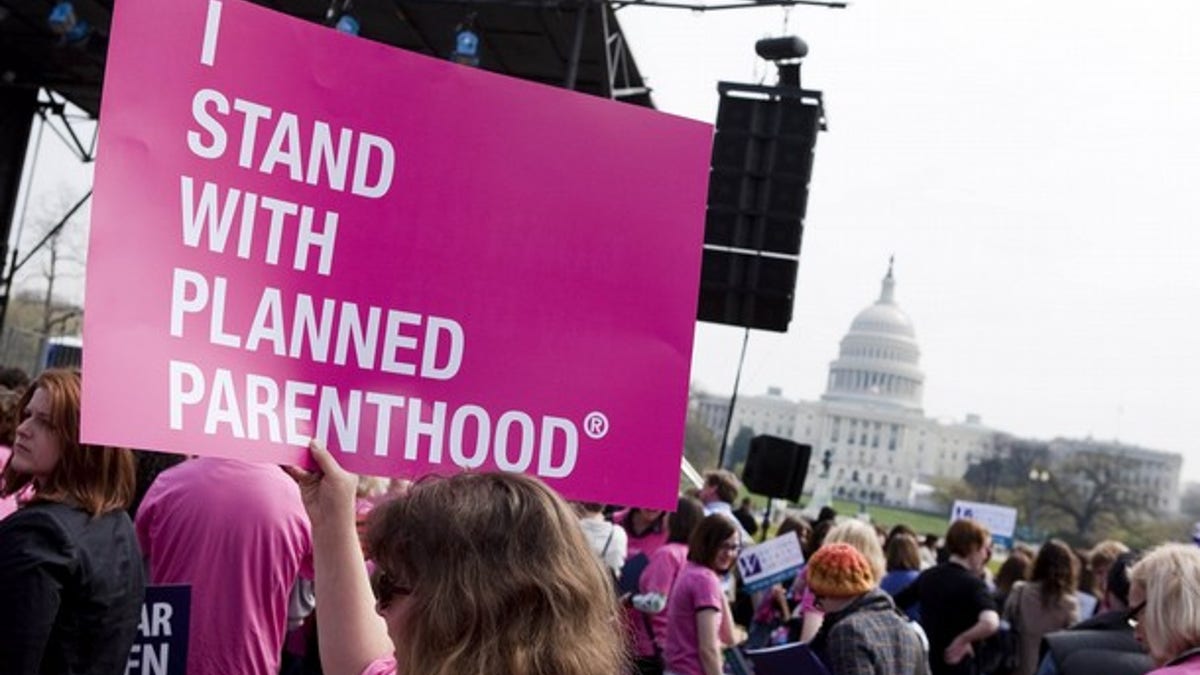
FILE: In this April 7, 2011, photo, members of Planned Parenthood, NARAL Pro-Choice America and more than 20 other organizations hold a "Stand Up for Women's Health" rally in support of preventive health care and family planning services, including abortion, in Washington. (Reuters)
After Republican efforts in Washington to defund Planned Parenthood fizzled this month, several states are now in a race to become the first to strip the organization of all taxpayer money.
Kansas, Indiana, North Carolina, New Hampshire and Texas are among the states who are taking up the fight that the GOP-led House couldn't finish when the White House and the Democratic-controlled Senate risked a government shutdown to protect Planned Parenthood from Republican knives.
And unlike Washington, where Democrats still control two thirds of government, Republicans are flexing their muscles in states where they made historic gains in legislatures and governors' mansions in last fall's midterm elections. With their new power, Republicans have escalated their fight against abortion and its providers -- particularly Planned Parenthood -- alarming abortion-rights supporters.
"I think we're in the midst of a wave this year of activism by social conservatives and they not only don't like abortion, they don't like family planning," said Elizabeth Nash, who tracks state legislation for the Guttmacher Institute, a reproductive-health research organization that supports abortion rights.
Following a Senate vote earlier this month in Indiana, the House on Wednesday voted 66-32 to cut off $3 million in federal money the state distributes to the family planning group. The bill is now in Gov. Mitch Daniels' hands, and some say he risks losing $4 million in federal Medicaid money if he signs it into law, a claim that is in dispute. Planned Parenthood officials are urging Daniels to veto the bill or face a court challenge to the defunding.
In Kansas, Gov. Sam Brownback has proposed in his 2012 budget stripping Planned Parenthood of $300,000 in federal family planning funds and redirecting it to state and local health clinics. Lawmakers are expected to vote on the proposed budget in the coming weeks. If passed, it will take effect on July 1.
In North Carolina, the proposed state budget includes a ban on state contracts with Planned Parenthood for teen pregnancy prevention and family planning that would cause the organization to lose $473,000.
States currently subsidize Planned Parenthood with a variety of government funding, including Medicaid and local taxes. These bills would eliminate all streams of government funding.
But Mary Kahn, a spokeswoman for the Centers for Medicare and Medicaid Services (CMS), said states that try to restrict Medicaid beneficiaries freedom of choice for family planning services "risk losing federal support."
"States cannot restrict Medicaid beneficiaries freedom of choice of family planning services even if the state is running a managed care program," she said.
In New Hampshire, where Republicans took control of the Legislature in November, the House is considering a bill that would cut $700,000 in public money state sends to Planned Parenthood. The legislation bans all state contracts with any service provider that offers abortions.
Some states have set their sights beyond Planned Parenthood and targeted public funding for all family planning services.
In Texas, the Republican-controlled House stripped more than $60 million from its proposed state budget plan intended for family planning services, shifting some of the money to anti-abortion programs and crisis pregnancy centers. But the state's Republican senators are fighting those cuts in favor of a version that cuts only $12 million.
Last year, New Jersey's Republican governor, Chris Christie, cut $7.5 million from the state budget for 58 clinics specializing in women's reproductive health, effectively eliminating any public funding for family planning services.
Nash told FoxNews.com that the proposed cuts in Texas would have the biggest impact on family planning services. But she said her money is on Indiana becoming the first to defund Planned Parenthood, though certainly not the last. She said the trend is "unfortunate" because family planning is a "fundamental right in this country and it makes sense for people to have support when they do it."
"And it's a real shame when state legislators take an ideology and try to impose it on public health," she said. "We need to be funding these services. To deny this kind of care to women, it really says that legislators don't care for women's health or their families."
Federal law already prohibits Planned Parenthood from using federal funds funneled through the state to pay for abortion. And Planned Parenthood says abortions comprise just 3 percent of the services it provides. Its clinics across the country perform 1 million screenings for cervical cancer, 830,000 breast exams and some 4 million tests and treatments for sexually transmitted diseases.
If Planned Parenthood is defunded, abortion-rights supporters argue, poor women will suffer the most because they often have limited choices for health care.
But conservative lawmakers say that any money the organization receives at least indirectly supports abortions.
"If that money goes to Planned Parenthood to use for other purposes, that frees up Planned Parenthood to fund abortions, that's the problem we have with it," Kansas Rep. John Rubin told Fox 4 in Kansas, adding that a majority of Kansas lawmakers support the provision.
But Peter Brownlie, president of Planned Parenthood in Kansas and Mid-Missouri, said none of those funds can be used directly or indirectly for abortions.
"We are facing legislative attacks," he told Fox4 in Kansas. "An overall effort to make it more difficult, if not impossible, for women to obtain what is their constitutional right to have access to abortion."





















